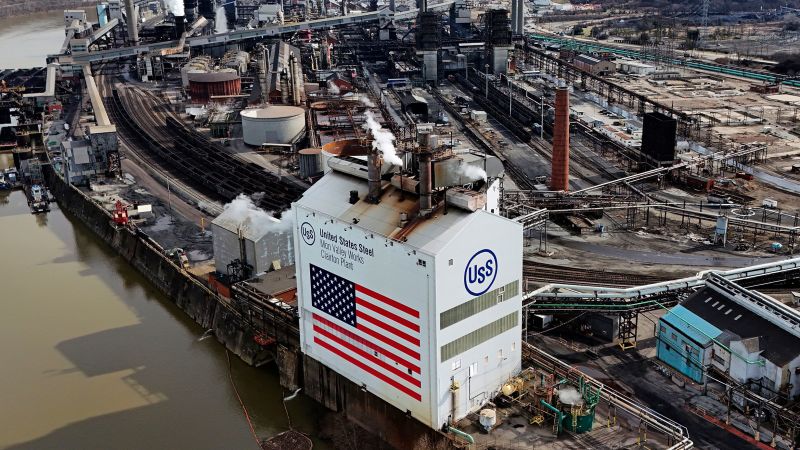New York
CNN
—
President Joe Biden said Friday he is blocking a $14.3 billion acquisition of US Steel by Japan’s Nippon Steel, marking a significant use of executive authority in the closing days of his administration.
“As I have said many times, steel production – and the steel workers who produce it – are the backbone of our nation,” he said in a statement. “A strong domestically owned and operated steel industry represents an essential national security priority and is critical for resilient supply chains.”
The move, which was first reported in the Washington Post and New York Times, is not a surprise but could have implications for future foreign investment in American companies. Biden has long said he opposed the deal, which was announced a year ago. President-elect Donald Trump also said he opposes the deal and that he also would block it once he takes office.
The deal has been politically charged since it was announced in December of 2023, stirring bipartisan political opposition to foreign control of a once key component of US industrial might which has fallen on hard times. Blocking the deal could be politically popular domestically but could scare away foreign investment in other US companies. It could also starve US Steel of investment it says it needs.
Late last month, the Committee for Foreign Investment in the United States, known colloquially as CFIUS, notified Biden that it had not reached a consensus about whether or not US Steel’s sale to Nippon would pose a national security risk, leaving the decision up to the president to determine whether or not to block the deal on national security grounds.
The United Steelworkers union has strongly opposed the deal since the moment it was announced, arguing that Nippon has not given it sufficient guarantees that it would protect unionized jobs at some of the company’s older mills staffed by union members.
But Biden’s opposition to the deal may not be the final say. US Steel and Nippon Steel issued a joint statement vowing to fight it in court.
“We are dismayed by President Biden’s decision,” said the statement. “The president’s statement and order do not present any credible evidence of a national security issue, making clear that this was a political decision. We are left with no choice but to take all appropriate action to protect our legal rights.”
The USW praised the decision.
“We have no doubt that it’s the right move for our members and our national security,” the union said in a statement.
US Steel and Nippon have argued throughout the process that the deal is necessary to provide needed investment in US Steel’s domestic steel operations. US Steel has claimed it could be forced to shut down the mills represented by the USW if it doesn’t get the $2.7 billion in investment planned by Nippon Steel as part of its proposed purchase. The companies’ joint statement Friday again repeated that argument.
“Blocking this transaction means denying billions of committed investment to extend the life of US Steel’s aging facilities and putting thousands of good-paying, family-sustaining union jobs at risk,” said the statement.
The union said Friday that the company can continue to profitably operate those mills without Nippon’s investment.
“We’re confident that with responsible management, US Steel will continue to support good jobs, healthy communities and robust national and economic security well into the future,” said the union.
The proposed purchase was bound to be unpopular. US Steel was once a symbol of American industrial might. It was the most valuable company in the world and the first to be worth $1 billion soon after its creation in 1901. It was also crucial to the US economy and the cars, appliances, bridges and skyscrapers that tangibly indicated that strength.
But it has suffered through decades of decline since its post-World War II height. It is no longer even the largest US steelmaker, and a relatively minor employer, with 14,000 US employees — 11,000 of whom are USW members. But it is still not a company that politicians who enjoy talking about American greatness want to see fall into foreign hands — particularly in the politically significant state of Pennsylvania. While it doesn’t employ nearly as many people as it used to, US Steel reports that it has nearly 18,000 retirees and beneficiaries drawing benefits from its pension funds. And there are hundreds of thousands whose parents, grandparents or even great-grandparents worked at US Steel at one point.
Demonstrating that blocking the deal appears political in nature, Trump opposed Nippon’s purchase of US Steel, but recently welcomed a $100 billion investment from Japan’s Softbank, including funds for investment in US artificial intelligence technology — arguably far more important for national security. If US Steel’s purchase by a Japanese company poses a national security threat, some foreign investors may think twice about spending resources on mergers and acquisitions or investments in American companies.
Multiple officials familiar with the review expressed concern to CNN that the decision would be seen as a watershed moment for the Committee on Foreign Invesment in the United States, or CFIUS, which has authority to evaluate mergers on national security grounds.
The conclusions of the Cabinet-level political appointees who comprise the Committee are informed by the work of roughly a hundred career staffers tasked with evaluating a deal on its merits without political influence. In the US Steel case, the majority of agencies concluded that the deal posed no national security risk, and officials expressed concern that the president’s own position — to keep the company from being foreign-owned even if it meant denying it a large infusion of capital from Nippon — was misguided.
“Bad decision,” one senior administration official said of Biden’s forthcoming move to block the deal. “Doesn’t actually protect union jobs and may kill the company.”
Throughout the 19th and 20th centuries, workers flocked to Pittsburgh and other Rust Belt cities for well-paying factory jobs. Blast furnaces opeated by US Steel and its American rivals cranked out steel slabs, beams and rails, along with massive profits and thick smog.
According to a story in the Pittsburgh Post-Gazette on the US Steel’s 100th anniversary in 2001, the company’s peak employment of 340,000 came in 1943, during World War II, when it played a critical role in Allied forces’ war efforts. The same article said the company’s steel output reached 35.8 million tons by 1953, as steelmakers in Europe and Japan were still struggling to recover from the war.
By comparison, US Steel shipped only 11.3 million tons of steel from its US operations in the 12 months ending in September, utilizing just less than two-thirds of the capacity of its older, union-represented steel mills.
After its peak, the company began to fall behind upstart competitors, both foreign and domestic. First, it fell behind competitors in Japan and Germany, which were forced to rebuild from scratch after World War II and use new technologies that required far less labor and energy.
US Steel and other American steelmakers eventually followed those foreign competitors to upgrade factories and equipment, but they still largely used the older methods to make steel by melting raw materials, such as iron ore, in giant blast furnaces.
Those “integrated” steelmakers soon lagged behind so-called “mini-mills,” nonunion competitors that use more efficient electric arc furnaces to turn old steel scrap from discarded cars and other products into new steel products.
One pioneer of this mini-mill technology, now Charlotte-based Nucor (NUE) has a market capitalization of $26.9 billion, compared to US Steel’s value of just over $7 billion.
US Steel “peaked out in 1916,” longtime steel industry analyst Charles Bradford told CNN in 2023, shortly after the company announced it would consider offers to buy it. “It’s been downhill ever sense. Peak output was in the 1970s. It’s done nothing for decades.”
Bradford said US Steel and other American integrated steelmaking rivals with storied names such as Bethlehem Steel, Inland Steel and LTV Steel underestimated the competitive challenge that they faced from overseas and mini-mills at home. Those rivals Bethlehem, Inland and LTV went bankrupt in the last 30 years and saw assets closed or sold to other companies.
Today, what’s left of those companies’ assets are part of Cleveland-Cliffs, a unionized integrated steelmaker that has also passed US Steel in capacity and output. Cleveland-Cliffs said it was prepared to buy any mills that US Steel would want to close, but such a move could run into its own antitrust problems due to opposition from steel customers, such as automakers that still depend upon steel made from raw materials rather than scrap.
Nippon said it does not intend to close the integrated mills, and that it will honor all labor contracts with the USW in addition to making the investment in plants where the union’s members work.
But the USW insists that Nippon’s plans would endanger those unionized jobs as well. It said Nippon intends to ultimately transfer production from integrated, union-represented mills in Pennsylvania and Indiana to US Steel’s own mini-mill operation in Texas.
Shares in US Steel (X) were down about 6.53% in early morning trading.
CNN’s Anna Cooban contributed to this story.
This story has been updated with additional content.




/cdn.vox-cdn.com/uploads/chorus_asset/file/25819081/Predator_Helios_18_AI_PH18_73_lifestyle_2.jpg)






